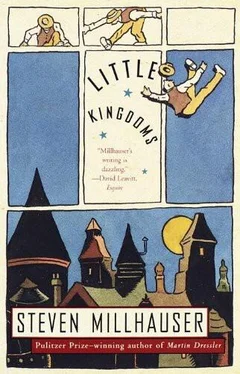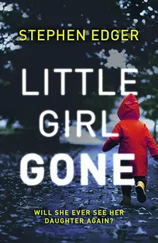A week later he recalled that other life as he sat in his office at the World Citizen , his drawing board slanting from the edge of the desk to his stomach. He was sketching another cartoon for one of Kroll’s editorials, in which he showed a German housewife buying a single egg with a wheelbarrow full of money sacks. The idea was hopelessly trite. A trapped fly buzzed between the half-open Venetian blinds and the window. Franklin wondered how long it took to photograph 12,324 drawings, and for some reason he remembered the sad-eyed shoemaker staring at the red high-heeled shoe. He wondered whether flies ever died of boredom. Perhaps he should turn the housewife into a witch trying to purchase a toad for her pot. There was a knock on the door, and Franklin looked up. He was about to say “Come in” when the door opened and Max entered.
“You look as if you haven’t moved for two years,” Max said.
“I haven’t,” said Franklin.
Max sat down on the edge of the desk and drummed his fingers on a pad of paper.
“You could have saved three hundred to five hundred hours if you’d used cels. Our inkers could have saved you another two-three hundred hours, our in-betweeners ditto. At a conservative estimate I’d say you threw away four to six months of your working life making unnecessary wiggles. The alignment’s shaky — there’s a flicker — strictly amateur stuff. A kid of seventeen without a scrap of talent can align perfectly using the peg system. Now listen to me. Here’s what I propose. Last month we decided to ditch National Pictures and distribute through Cinemart, where we can cut a much better deal. This one needs to be handled a little differently because of the length, and Cinemart is the best in the business when it comes to special angles. They can get it out there like nobody’s business and once it’s in the theaters we think it will draw. We’ll work with them on publicity and we’ll supply the art for the lobby poster. You don’t have to worry about a thing. I’ll have Milt draw up a contract. Don’t forget the housewarming on Saturday. By the way, congratulations. It’s a masterpiece. The boys are gaga over it.”
“The reason I don’t like cels,” Franklin began, but Max had already put on his hat. The door shut behind him. Franklin pulled over his drawing board, picked up his pencil, and did not draw. Had he wasted four to six months of his life through sheer stupid stubbornness? He had no dislike of technological progress, of up-to-the-minute systems and methods. He was fascinated by the latest advances in the art of home refrigeration, by recent developments in camera shutters and the steering mechanisms of automobiles. Above all he loved the machinery of newspaper production, from the zinc plates with their dots of blue or red or yellow ink for printing Sunday comics in color to the automatic cutters and folders that transformed the long rolls of paper into thick, perfectly folded newspapers. In the early days in Cincinnati he had taken time to visit the composing room and watch the Linotype operators at work, and observe the splendid machine itself as it dropped the correct brass matrix in place after each key was pressed and, after the slug was cast, distributed the individual matrices back to their original locations in the magazine. His objection to the cel system wasn’t that it saved labor, or that it represented a technological advance; his objection was that it encouraged stable backgrounds, whereas his experiments in changing perspective required continual slight shifts in the entire background image. The cel system also encouraged a split between background and animation, expressed in the studio as a division of labor among different kinds of artists, whereas for him the image was a single complex unit of interconnected lines. Moreover, he had seen dozens of Vivograph cartoons, he had followed the cartoons of other studios, and he had passed judgment: the sequences were smooth, the motions fluid, the gags clever, but the drawing — the drawing was mediocre. And there was another thing, something he had no name for but felt in his mind’s fingertips: the cartoons lacked something, they left him restless and disenchanted; and this thing that they lacked, that had no name, was the only thing that mattered, and was somehow connected with his father’s grave voice in the darkroom and the mystery of the developer tray. And yet — and yet. He had to admit to himself that Max’s words had disturbed him. After all, it wasn’t true that every one of his backgrounds was different from the others; there was a great deal of repetition, of mechanical and laborious retracing. In the future he would have to consider adopting a partial cel system. And one more thing bothered him: the flickers from faulty alignment. If he ever made another animated film, he would use pegs instead of crosses. And at the thought of making another cartoon, tiredness rippled in his temples like a flutter of headache.
On Saturday afternoon Cora went into town to pick out a present for Max’s party and try on hats, while Franklin took Stella rowing on the river. It was a sunny blue day in September. The pines and oaks at the river’s edge, the blue sky, the lifted white oars, all showed clearly in the shiny dark water; here and there the green was streaked with red and yellow. Franklin rowed downriver, away from Max’s house. Mount Hebron ended and hilly farms came down to the water. Strands of green cornstalks edged with brown lay burning in the September sun. Stella, in her straw hat with the brilliant red wooden cherries, sat trailing her hand in the water. In the shade of a spreading oak, seven cows resting on their stomachs all raised their heads and stared at the passing rowboat. “They’ve never seen cows like us,” Franklin said. Stella looked at him with a faint smile; her grave beauty was a darker version of Cora’s. The shadows of branches rippling across the straw hat, the brilliant blue air, the sudden orange and yellow of a turning sugar maple, the distant barns, the lazy amble of cows — all this filled Franklin with delight and a gentle, yellow-orange melancholy. Their first summer in Mount Hebron, he and Cora and Stella had gone picnicking on the riverbank every Sunday. Was it so long ago? Cora had told him about family outings on the banks of the Ohio when she was a child: from the picnic basket had come wineglasses and a bottle of wine and a silver cream pitcher and silver bowls and fresh strawberries. “I wish Mom was here,” Franklin said, watching drops of water fall from the oars. He too remembered childhood picnics by a river, not far from Plains Farms: a willow had trailed its branches in the water. “Mom hates going anywhere with us,” Stella said sharply. Panic flared in his chest. “Well now,” he said, “I wouldn’t exactly say that,” and kept on rowing.
Back at the house he found a note from Cora on the kitchen table. “Ran into Max all jittery in town. Agreed to help set up for party. Meet us there 5:30—yes? Stella can wear her new patent leathers. Don’t let her wear the blue dress — it’s a fright. C.” It was half-past three. For the next hour Franklin played croquet with Stella and then went inside to change for the party: a dress-up affair, for which he chose his tuxedo jacket. Stella wore her red party dress with the white lace collar and her white straw hat with the black velvet band. Franklin drove to the ferry and missed the five o’clock crossing by two minutes; he stood on the dock and watched three yellow-green leaves bobbing in the ferry’s wake. Half an hour later he stood with Stella at the rail and looked down the river toward Mount Hebron as they crossed. The warm air had an underlayer of chill; a tang of autumn filled the late afternoon. On the other side, dusk had fallen; he drove on a dirt road through a gloom of pines. A new road ran behind the house, but Franklin preferred the old one, which grew gradually impassable and stopped in the middle of the woods. Through the trees he could see the house, its lights burning in the green dusk. He and Stella walked through the underbrush and came out of the trees onto a path leading to the long front porch. The porch and sloping lawn were crowded with guests in pale dresses and summer suits; Max and Cora stood with drinks in their hands, talking to a young couple both dressed in white.
Читать дальше












